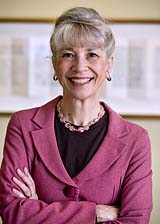Bates Matters

Founded by reformers intent on solving the most difficult social problems of their day, Bates has always seen room for its own improvement as well.
In 1894, at George Colby Chase’s inauguration, the 50-year-old English literature professor considered how the College should evolve to meet the demands of the fast-paced Gilded Age, noting that Bates must “anticipate…that world in which its students are to live.” Our mission, Chase argued, was to produce broadly and deeply educated men and women who can “be at home in the world as the world presents itself today” and take full advantage of “the opportunities that the many-sided life of our age may offer.”
With Chase’s words still resonating across more than a century, we begin the 2007–08 academic year with a renewed focus on planning that is responsive to both the ever-changing landscape of higher education and the world as it presents itself today. We ground our thinking and our method in the fundamental belief that each member of our College community plays a different and important part in achieving a compelling goal: sustaining and enhancing an educational institution that attracts the brightest and best undergraduates in the world and provides them with a transformative academic experience.
As we work toward this vision to the best of our individual abilities, we need from time to time to reflect collectively on where we are and where we want to go. Our college has flourished because Bates people value working across individual and group differences to common ends. As Chase also said, the College is a place where the “rich and the poor, the highest and the humblest might mingle on equal terms in the spirit of mutual helpfulness.”
Working together, we see so many opportunities on the horizon, ranging from the possibilities of cutting-edge undergraduate science education to the integration of multiple ways of knowing. We understand better than ever the importance of offering a spectrum of learning opportunities: through traditional and emerging academic fields, complex encounters with other languages and cultures, experiences in the arts and performance, and involvement with service-learning and the local community.
We have already begun to anticipate new ways of maximizing and connecting these opportunities. Examples include the innovative revision of our General Education requirements and the thoughtful design of educational space for a residential community within the Campus Facilities Master Plan.
This year, we aim to integrate our ongoing efforts through an inclusive, transparent, and efficient initiative to plan our next significant steps on the path forward. We approach this enterprise fully aware that well-intentioned planning efforts, which are ubiquitous in higher education today, often start out with great enthusiasm and hope but end up in frustration and disappointment. As Henry James once put it, “One’s plan, alas, is one thing, but the results are another.” So we’re not proposing the kind of time-consuming strategic planning that produces a fine document that sits on a shelf. We are interested instead in thinking creatively, in the spirit of mutual helpfulness, and then making some specific choices that will guide our immediate deployment of precious resources — above all, our collective time and talent — toward becoming the best we can be.
The planning process we have selected has begun with a series of conversations. In small group gatherings to which faculty, staff and students have been invited through a process of random selection, we have spent the first few weeks of this academic year talking about the very biggest questions. What makes Bates great today? What about the Bates experience should change over the next five years, and what should stay the same? How can we address some of the sweeping changes in the higher education environment in ways that are proactive, and that best prepare our students for the world in which they are to live? At this early “visioning” stage, we seek the widest possible range of responses without rushing to judgment or ruling anything out.
Using what we learn from these conversations, I will work with a steering group to articulate a few key topics around which we will form smaller working groups charged to develop, by the end of second semester, specific plans for things we can accomplish in the next three to five years.
We seek to articulate no more and no less than a set of inspiring and feasible strategic projects that will allow us to focus our efforts and achieve clear results. And as this work unfolds, I look forward to updating the Bates community and inviting your input at appropriate intervals.